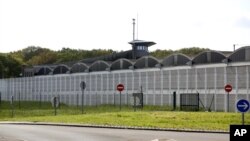Reports of new incidents trickle in steadily through the French media. Ten radical Islamists are quietly removed from the massive Fleury-Merogis prison over fears of an uprising. In another prison, homemade weapons are discovered in the cell of at least one suspected radical.
Then there was the stabbing of two prison guards earlier this month - an incident that prosecutors are investigating for terrorist motives.
French prisons have long been criticized as overcrowded incubators of Islamist militants; but, as the leftist government tries to grapple with terrorism both at home and abroad, its proposals for fighting radicalization within its penitentiary system are being criticized on multiple fronts.
Following the stabbings, Justice Minister Jean-Jacques Urvoas announced a series of new security measures being released this week, particularly in new specialized prison ‘de-radicalization’ units - an experiment being echoed elsewhere in Europe.
The units aim to “disengage” the prisoners from violence and “break their sense of self-isolation,” Urvoas told the Le Journal du Dimanche weekly. “It’s a moral duty, but also an imperative for national security.”
‘Real powder kegs’
Philippe Campagne, secretary general of SNP-FO, a national union representing prison guards, denounced the new security measures, along with the government’s broader strategy of handling the radicalization.
“The idea of deradicalization is good, but what’s happening in French prisons is not that,” Campagne said in an interview, calling for the complete isolation of radical inmates and describing the 188 French prisons housing them as “real powder kegs.”
Rights activists argue the opposite, saying efforts to isolate potential radicals may tip them to extremism.
For French authorities, the push to act is urgent after a spate of terror attacks and foiled attempts. Over the last week alone, authorities announced they had smashed an all-woman militant cell plotting two attacks, and arrested a teenage boy suspected of preparing imminent ‘violent’ action.
"Today the threat is at a maximum, and we are a target," Prime Minister Manuel Valls said Sunday, estimating about 15,000 people were being monitored for radicalism across France.
Concerns not new
Concerns about the spread of Islamist radicalism are not new in a penitentiary system where Muslims make up roughly 60 to 70 percent of the inmates.
Notable inmates include the January 2015 Paris attacks assailants Amedy Coulibaly and Cherif Kouachi, who met during their incarceration at Fleury-Merogis, Europe’s largest prison located about 30 kilometers south of Paris. Salah Abdeslam, the sole surviving suspect in last November’s attack, is also holed up there in isolated confinement.
Today, the government estimates nearly 1,400 French prisoners are radicalized, including some 325 jailed on terrorist charges - figures some rights activists question.
This year, authorities opened special “deradicalization” units within five prisons, each equipped with sociologists, psychologists and other specialists to turn around extremists.
The deradicalization experiment suffered a setback this month, when participant Bilal Taghi attacked two guards, stabbing one in the back and the throat. According to the Liberation newspaper, the 24-year-old then drew a heart on a wall with the blood of his victim, before starting to pray.
The new measures introduced this week aim to step up prison security and further limit any communication between radicalized and other inmates.
Critics say the measures are insufficient. Former center-right president Nicolas Sarkozy, who is running again for the office, wants to create special courts and detention facilities for radicals, while dismissing any notion of a "Guantanamo a la Francaise."
Pros and cons of isolation
Prison employee unions are also pushing for dedicated facilities for extremists - a notion rejected by the leftist government.
“We want a single national establishment created where radicalized prisoners are really isolated, where they’re not crossing other prisoners,” says Campagne of the FO prison syndicate.
“We see more and more people radicalizing in French prisons,” he added, “and if we don’t take stock of this and put the necessary measures in place, those numbers will explode in future months.”
But the International Observatory of Prisons, a Paris-based group campaigning for prisoners' rights, is against isolating suspected radicals, and questions the government’s figures of radicalized inmates.
“There’s such variety in the profiles” ranging from a hardened Islamist to someone who merely consults jihadist websites, says Observatory member Camille Rosa, making a single treatment of them “the bad response.”
Rather than isolating prisoners, she says, the better strategy would be to mix those at risk of becoming radicalized with the larger population “so they can see other backgrounds.”
“It’s absolutely essential that the rights of prisoners are respected,” she added, “including those deemed terrorists or in danger of being radicalized.”










